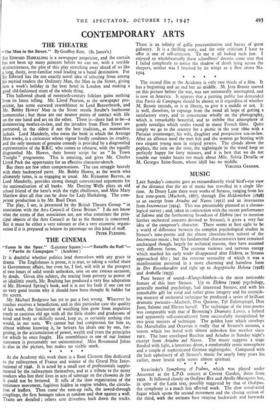THE CINEMA
"Fame is the Spur." (Leicester Square.)—" Bataille du Rail"— " Partie de Campagne." (Academy) )
IT is doubtful whether politics lend themselves with any grace to drama. The Englishman is prone, it is true, to taking a verbal share in Government affairs, but even he I feel, will wilt at the prospect of two hours of solid words unbroken, save on one riotous occasion, by deeds. Given this subject, the tracing from poverty to power of an idealistic youth, Mr. Boulting has produced a very fine adaptation of Mr. Howard Spring's book, and it is not his fault if one can see no very good reason why it should have been thought fit fodder for the screen.
Mr. Michael Redgrave has yet to put a foot wrong. Whatever he touches receives a benediction and in this particular case the quality of his work, the fascination Of watching him grow from impulsive youth to cautious old age with all the little shades and gradations of mind and body so skilfully noted, keep us, as certainly nothing else would, in our seats. We cannot but feel compassion for him as, almost without knowing it, he betrays his ideals one by one, for- getting, in the accumulation of power, wealth and years the principles for which he once fought. His resemblance to one of our former statesmen is presumably not unintentional. Miss Rosamund Johns is also in the picture, but makes no visible mark. * * *
At the Academy this week there is a Rene Clement film dedicated to the railwaymen of France and winner of the Grand Prix Inter- national of 1946. It is acted by a small cast of professionals supple- mented by the railwaymen themselves, and as a tribute to the many workers who lost their lives in acts of sabotage on the chemins de fer it could not be bettered. It tells of the slow organisation of the resistance movement, fugitives hidden in engine tenders, the circula- tion of leaflets. Then come' the torn-up rails, the sawed-through couplings, the first hostages taken at random and shot against a wall. Trains are derailed ; others sent driverless back down the tracks.
There is an infinity of gallic procrastination and bursts of great gallantry. It is a thrilling story, and the only criticism I have to offer is one of self-criticism. To me it all looked such fun. I enjoyed so wholeheartedly these schoolboys' dreams come true that I failed completely to notice the shadow of death lying across the sleepers, neither was I brushed by its wings as it flew above No. 1504. * * *
The second film at the Academy is only two thirds of a film. It has a beginning and an end but no middle. M. Jean Renoir started on this picture before the war, was not unnaturally interrupted, and is now in America. It appears that a panting public has demanded that Partie de Cam pagne should be shown to it regardless of whether M. Renoir intends, or is at liberty, to give it a middle or not. It is well, therefore, to expunge from the mind all hope of getting a satisfactory story, and to concentrate wholly on the photography, which, is remarkably beautiful, and to imbibe that atmosphere of gentle nostalgia which settles round so many French films. Quite simply we go to the country for a picnic in the year 1860 with a Parisian ironmonger, his wife, daughter and prospective son-in-law. After an alfresco meal the men fish and the women go boating with two elegant young men in striped jerseys. The clouds above the poplars,' the rain on the river, the nightingale in the wood keep us perfectly happy for forty minutes, and it is best that we do not trouble our tender hearts too much about Mlle. Sylvia Detaille or M. Georges Saint-Saens, whose idyll has no middle.
VIRGINIA GRAHAM.


































 Previous page
Previous page